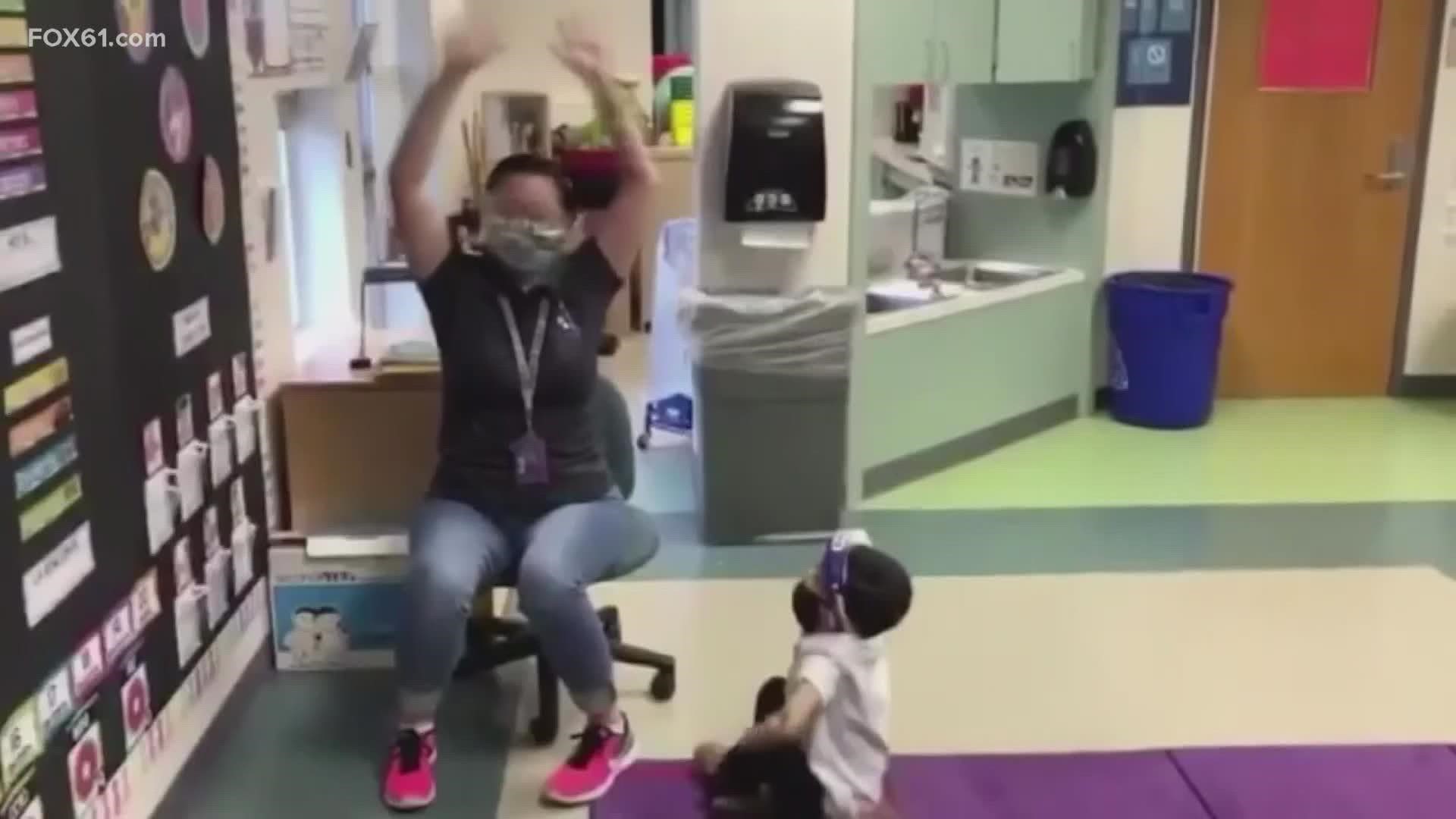CONNECTICUT, USA — In an effort to keep kids in school and close the learning gap, Gov. Ned Lamont and state officials announced a new initiative: Screen and Stay.
Under the initiative, students and staff identified as close contacts to a known COVID-19 case, but who are not yet fully vaccinated, will be able to remain in school and not quarantine if they are wearing masks and don't develop symptoms.
Lamont's administration said the initiative would bring an end to frequent and repeated quarantines that negatively impact a student's ability to learn, and place a burden on working families.
The initiative is optional for schools that choose to participate.
"Screen and stay in school is one more signal of success in our battle against COVID," the governor said.
“As a state, we have continued to reinforce throughout the pandemic that access to in-person learning opportunities is a priority, particularly due to the significance of the supportive social-emotional environment provided through student and adult interactions during the school day,” Connecticut Education Commissioner Charlene M. Russell-Tucker said. “Screen and Stay advances our commitment to in-person schooling, where our students learn best.”
The governor, state public health and education officials visited Newington High School on Thursday to announce the new initiative.
"This is our first step in our off ramp in this pandemic," DPH Commissioner, Dr. Manisha Juthani said. "You have an opportunity if you are identified as a contact to be screened for a number of symptoms. The things we know COVID can cause and if you don’t have those you can keep coming to school."
FOX61 asked Dr. Juthani how this policy makes sense from a public health perspective, since you don’t have to show symptoms to have and spread the virus.
She pointed to the multiple layers of mitigation in schools such as masks, vaccines and social distancing. Dr. Juthani also admitted they are "making a calculated risk, based on data."
The alternative to screen and stay is test and stay.
Dr. Juthani explained that the state chose not to make COVID-19 testing a requirement of the policy because it is extremely costly.
"It’s intense and cumbersome on the schools and there’s a very limited supply on those rapid tests that you need for that and you need to have certain certification in your school to be able to even perform that laboratory testing," she added.
According to Lamont's administration, students and staff are eligible to participate if close contact with a COVID-19 case occurs under the following circumstances:
- Exclusively during the school day (no extracurricular or social contact);
- If indoors or on a school bus or other school transportation, and both the contact and the COVID-19 case were consistently masked during the exposure even if brief unmasked periods (e.g., snack time, cafeteria) occurred, as long as six feet or more of space was consistently maintained;
- If outdoors, the individuals were masked or unmasked but were supervised by staff (e.g., mask breaks, physical education, recess);
- The close contact remains asymptomatic (any symptoms revert to regular isolation/quarantine).
Examples of close contact scenarios that do not support a Screen and Stay approach would be:
- Contact with a case during interscholastic or other athletic activities (other than during supervised outdoor physical education and recess);
- Contact occurring during social interactions or similar activities outside of school (e.g., birthday parties, dining out, sleepovers);
- Contact where the individuals were not consistently and correctly wearing masks indoors and a six-foot distance was not maintained;
- The contact occurred between members of the same household (i.e., the contact lives with the case);
- If, upon return to school, the contact cannot consistently and correctly wear a mask.
“Throughout this pandemic, we’ve consistently done our best to maintain a safe learning environment for all students and staff, while also understanding that students achieve the greatest outcomes when they have access to in-person learning,” Lamont said. “The recent approval of the COVID-19 vaccines for children between the ages of 5 and 11 marks an incredibly promising development in these ongoing efforts. While that rollout occurs, the Screen and Stay initiative will help ensure that more students can remain in school and we can provide a safe, in-person learning environment.”
This week, the Centers for Disease Control and Prevention (CDC) gave final clearance on the emergency use of the Pfizer vaccine for children 5-11 years old.
Lamont said Tuesday, shortly after clearance was given, that the rollout is critical for schools, not just for protecting kids but also for family, teachers and school staff.
"We estimate that about 277,630 children between ages 5 and 11 live in Connecticut, and our partners are ready and able to begin administering the vaccines to this age group. The date is clear: This vaccine is safe for kids and it works," said Lamont in a tweet Tuesday night.
The vaccine — one-third the dose given to older children and adults and administered with kid-sized needles — requires two doses three weeks apart, plus two more weeks for full protection to kick in. That means children who get vaccinated before Thanksgiving will be covered by Christmas.
Jennifer Glatz is a digital content producer at FOX61 News. She can be reached at jglatz@fox61.com.
---
Have a story idea or something on your mind you want to share? We want to hear from you! Email us at newstips@fox61.com
---
HERE ARE MORE WAYS TO GET FOX61 NEWS
Download the FOX61 News APP
iTunes: Click here to download
Google Play: Click here to download
Stream Live on ROKU: Add the channel from the ROKU store or by searching FOX61.
Steam Live on FIRE TV: Search ‘FOX61’ and click ‘Get’ to download.

